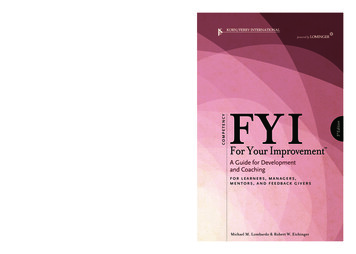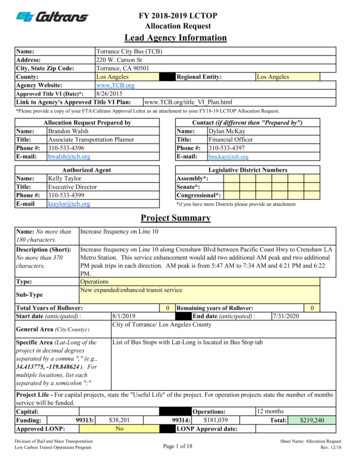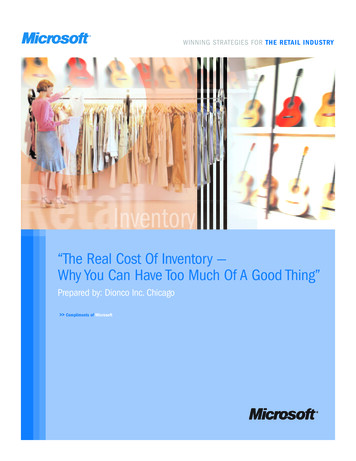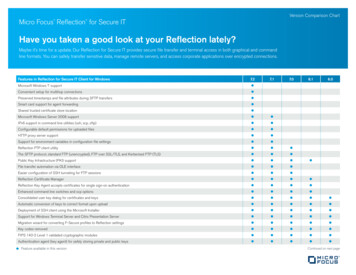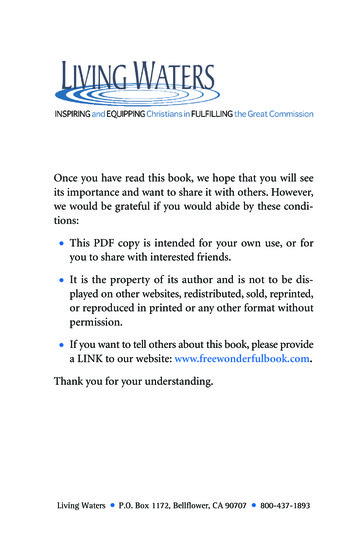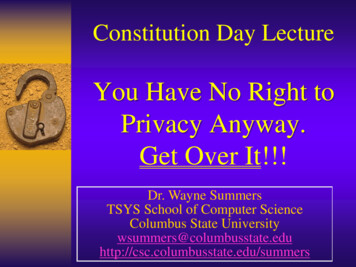
Transcription
Constitution Day LectureYou Have No Right toPrivacy Anyway.Get Over It!!!Dr. Wayne SummersTSYS School of Computer ScienceColumbus State umbusstate.edu/summers
29/19/2013Columbus State University
HEADLINE NEWS “Edward Snowden NSA files: secretsurveillance and our revelations so far” “FISC judge orders review of secret courtrulings on NSA phone surveillance” “NSA repeatedly ignored court surveillancerules, documents show” Congress Begins Investigation of NSADomestic Surveillance Program “EPIC urged the FCC to determine whetherVerizon violated the Communications Actwhen it released consumer call detailinformation to the National Security Agency “
(more) HEADLINE NEWS “Apple’s Fingerprint ID May MeanYou Can’t ‘Take the Fifth’” “IP Cloaking Violates Computer Fraudand Abuse Act, Judge Rules” “Protecting Your Privacy Could MakeYou the Bad Guy”
OUTLINE Questions Background (U.S. Constitution & Privacy) Intelligence Community and our Privacy Personal Privacy Issues Protecting Personal Privacy Q&A
Questions “Should the gov't be able to monitor everyone'sphone calls to prevent possible terrorism?”– “Listen to” everyone’s conversations– “Track” everyone’s phone conversations (penregisters) “Should the gov't be able to monitor everyone'semail to prevent possible terrorism?”– “Read” everyone’s email– “Track” everyone’s email
Survey “Should the gov't be able to monitor everyone'semail to prevent possible terrorism?”52% NO[PEW Research Center - June 6-9, 2013]
After seven weeks of steady media coverage, thepercentage of Internet users worried abouttheir online privacy jumped 19 percent, from48 percent in June (when the story first appearedin The Guardian and Washington Post) to 57percent in July, according to Annalect, OmnicomMedia Group's data and analytics company.
Privacy (Confidentiality)freedom from unauthorizedintrusion one's right to privacy [Merriam-Webster Dictionary]Limiting who can access yourinformation.
U.S. Constitution & Privacy“The U. S.Constitutioncontains noexpress right toprivacy. ”Exploring Constitutional rials/conlaw/rightofprivacy.html
U.S. Constitution & Privacy Amendment I –(Privacy of Beliefs) Amendment III –(Privacy of the Home) Amendment IV –(Privacy of the Personand Possessions) Amendment IX –(General Protection forPrivacy)
U.S. Constitution & PrivacyAmendment IVThe right of the people to be secure in theirpersons, houses, papers, and effects, againstunreasonable searches and seizures, shall notbe violated, and no warrants shall issue, butupon probable cause, supported by oath oraffirmation, and particularly describing theplace to be searched, and the persons or thingsto be seized.Read s/article/0,28804,2080345 2080344 2080374,00.html #ixzz2egVR9Bw1Listen article/0,28804,2080345 2080344 2080374,00.html
U.S. Constitution & PrivacyAmendment IVThe right of the people to be secure in theirpersons, houses, papers, and effects, againstunreasonable searches and seizures,shall not be violated, and no warrants shallissue, but upon probable cause, supported byoath or affirmation, and particularlydescribing the place to be searched, andthe persons or things to be seized.Read s/article/0,28804,2080345 2080344 2080374,00.html #ixzz2egVR9Bw1Listen article/0,28804,2080345 2080344 2080374,00.html
Privacy Regulations Privacy Act of 1974– “No agency shall disclose any record whichis contained in a system of records by anymeans of communication to any person, or toanother agency, except pursuant to a writtenrequest by, or with the prior written consentof, the individual to whom the recordpertains. “ Foreign Intelligence Surveillance Act of 1978(or "FISA") - created a warrant procedure forforeign intelligence investigations
Privacy Regulations Computer Fraud and Abuse Act (CFAA)1986 [amended 1989, 1994, 1996, in 2001 by the USAPATRIOT Act, 2002, and in 2008 ]– “Whoever intentionally accesses acomputer without authorization or exceedsauthorized access, and thereby obtains— information from any protected computer “http://www.gsa.gov/portal/content/104250
Privacy Regulations Health Insurance Portability and AccountabilityAct of 1996 (HIPAA) Family Educational Rights and Privacy Act(FERPA) [Buckley Amendment] of 1974 Financial Modernization Act of 1999["Gramm-Leach-Bliley Act" or GLB Act]: protect consumers’ personalfinancial information held by financial institutions. Public Company Accounting Reform and InvestorProtection Act of 2002 [“Sarbanes-Oxley Act “]:establishes new or enhanced standards for all U.S.public company boards, management, and publicaccounting firms.
Privacy Regulations Exemptions UNITING and STRENGTHENING AMERICA byPROVIDING APPROPRIATE TOOLS REQUIREDto INTERCEPT and OBSTRUCT TERRORISM(USA PATRIOT ACT) of 2001, Title II ("EnhancedSurveillance Procedures") PATRIOT Sunsets Extension Act of 2011 (4-year extension)– roving wiretaps,– searches of business records ( "library records provision"),– surveillance of “lone wolves” “Department [of Homeland Security] proposes to exempt portionsof the system of records from one or more provisions of the PrivacyAct because of criminal, civil, and administrative enforcementrequirements.” (A Proposed Rule by the Homeland Security Department on 05/16/2013)
What NSA, FBI can do FISA, and amendments permit warrant for foreignintelligence investigations Supreme Court has held that there is no constitutionallyrecognized privacy interest in the telephone numbersintercepted by a pen register or trap and trace device USA PATRIOT ACT expanded pen register capacities tothe Internet, covering electronic mail, Web surfing, and allother forms of electronic communications.
What NSA, FBI can do Stored Communications Access Act - stored voice-mailcommunications, like e-mail, may be obtained by thegovernment through a search warrant rather than throughmore stringent wiretap orders. Section 218 expands FISA to those situations whereforeign intelligence gathering is merely "a significant"purpose of the investigation, rather than, the “sole” or“primary” purpose. Section 206 expands FISA to permit "roving wiretap"authority (allows the interception of any communicationsmade to or by an intelligence target without specifyingthe particular telephone line, computer or other facility tobe monitored.)
What NSA “can do” programs PRISM – data collection programs MAINWAY - telephone data-mining program XKeyscore, allows NSA analysts to interceptthe contents of e-mail and other onlinecommunications. ["has the capacity to reachroughly 75% of all U.S. Internet traffic."] Narus’ Semantic Traffic Analyzer– 1. Scans metadata– 2. Analyzes selected data
BIG DATA Internet carries 1.826 exabytes of data/day– 1 exabyte 1 000 000 000 000 000 000 bytes NSA “touches” 1.6% of the data (29.21 petabytes)– 2.77 terabits/sec– 0.025% [7.47 TB] of “touched” data isreviewed daily– 150 XKeyscore worldwide collection points,each keep 3-day buffer (600 terabytes)
Delivered-To: wsummers@columbusstate.eduReceived: by 10.194.165.101 with SMTP id yx5csp122551wjb;Mon, 16 Sep 2013 22:45:04 -0700 (PDT)X-Received: by 10.66.228.38 with SMTP id sf6mr35021115pac.21.1379396703226; Mon, 16 Sep 2013 22:45:03 -0700 (PDT)Return-Path: bounce-mc.us6 14879815.86829-wsummers columbusstate.edu@mail183.atl21.rsgsv.net Received: from psmtp.com ([74.125.149.112])by mx.google.com with SMTP idif6si20477981pbc.73.1969.12.31.16.00.00;Mon, 16 Sep 2013 22:45:03 -0700 (PDT)Received-SPF: pass (google.com: domain of bounce-mc.us6 14879815.86829wsummers columbusstate.edu@mail183.atl21.rsgsv.net designates 205.201.133.183 as permitted sender) clientip 205.201.133.183;Authentication-Results: mx.google.com;spf pass (google.com: domain of bounce-mc.us6 14879815.86829wsummers columbusstate.edu@mail183.atl21.rsgsv.net designates 205.201.133.183 as permitted sender) smtp.mail bouncemc.us6 14879815.86829-wsummers columbusstate.edu@mail183.atl21.rsgsv.net;dkim pass header.i new comic 3Dphdcomics.com@mail183.atl21.rsgsv.netReceived: from mail183.atl21.rsgsv.net ([205.201.133.183]) by na3sys009amx228.postini.com ([74.125.148.10]) with SMTP;Tue, 17 Sep 2013 05:45:02 GMTDKIM-Signature: v 1; a rsa-sha1; c relaxed/relaxed; s k1; d mail183.atl21.rsgsv.net;h bscribe:Sender:Content-Type:MIME-Version;i new comic 3Dphdcomics.com@mail183.atl21.rsgsv.net;Received: from (127.0.0.1) by mail183.atl21.rsgsv.net id h6vm5q1lgi4j for wsummers@columbusstate.edu ; Tue, 17 Sep2013 05:44:54 0000 (envelope-from bounce-mc.us6 14879815.86829wsummers columbusstate.edu@mail183.atl21.rsgsv.net )Subject: ?utf-8?Q?The 20Cult. 20New 20comic 21? From: ?utf-8?Q?PHD 20Comics? new comic@phdcomics.com Reply-To: ?utf-8?Q?PHD 20Comics? new comic@phdcomics.com To: wsummers@columbusstate.edu Date: Tue, 17 Sep 2013 05:44:54 0000Message-ID: @mail183.atl21.rsgsv.net List-Unsubscribe: 887d5a0ff1c1eea@mailin1.us2.mcsv.net?subject unsubscribe , http://phdcomics.us6.listmanage1.com/unsubscribe?u c007b6835f6475cf470f6e0ef&id e1376685f0&e a0ff1c1eea&c 3f7b8887d5 Sender: "PHD Comics" new comic phdcomics.com@mail183.atl21.rsgsv.net X-pstn-nxpr: disp neutral, envrcpt wsummers@columbusstate.eduX-pstn-nxp: bodyHash h dc13cf3f7d81ef786c8528c4bb4cbd85041a6718, keyName 4,rcptHash 8b4b7bb67b4c9f772ed3b52cf7ef6cebfd734211, sourceip 205.201.133.183, version 1
This is a multi-part message in MIME ick?u c007b6835f6475cf470f6e0ef&id 0945298c56&e a0ff1c1eeaclick here: http://phdcomics.us6.listmanage.com/track/click?u c007b6835f6475cf470f6e0ef&id 1474e9a89e&e a0ff1c1eeaAlso, PHD is now on Google !http://phdcomics.us6.listmanage.com/track/click?u c007b6835f6475cf470f6e0ef&id 7e3a4b2a5f&e a0ff1c1eea
Tracing route to phdcomics.com[69.17.116.124] from home computer 1 1 ms 1 ms 1 ms 192.168.1.1 2 3 12 ms 13 ms13 ms 172.30.78.1 4 13 ms 11 ms11 ms 172.30.30.54 5 11 ms 14 ms20 ms 12.250.24.25 6 13 ms 11 ms11 ms cr1.attga.ip.att.net [12.122.141.186] 7 13 ms 11 ms12 ms 12.122.141.233 8 17 ms 10 ms11 ms ae15.edge5.atlanta2.level3.net [4.68.62.225] 9 25 ms 25 ms28 ms 4.69.159.34 10 25 ms 24 ms 29 ms ae-63-63.ebr3.Atlanta2.Level3.net [4.69.148.241] 11 25 ms 25 ms 27 ms ae-2-2.ebr1.Washington1.Level3.net [4.69.132.86] 12 24 ms 26 ms 25 ms ae-81-81.csw3.Washington1.Level3.net [4.69.134.138] 13 42 ms 30 ms 32 ms ae-32-80.car2.Washington1.Level3.net [4.69.149.132] 14 25 ms 42 ms 37 ms ge1-1.bbsr1.iad.megapath.net [166.90.148.2] 15 29 ms 43 ms 26 ms 66.80.128.61 16 26 ms 27 ms 27 ms ae0-0.asbnvacz-mxc2.bb.megapath.net [155.229.57.50] 17 38 ms 37 ms 37 ms ae2-0.chcgilgb-mxc2.bb.megapath.net [155.229.101.169] 18 98 ms 93 ms 93 ms ae1-0.sttlwawb-mxc2.bb.megapath.net [155.229.101.113] 19 94 ms 93 ms 94 ms ae0-0.sttlwawb-mxc1.bb.megapath.net [155.229.57.85] 20 94 ms 93 ms 93 ms ge3-0-0.m10.stl.bb.megapath.net [155.229.101.189] 21 100 ms 93 ms 93 ms 155.229.120.186 22 86 ms 81 ms 81 ms ve191.ge0-1-0.core1.lax.megapath.net [66.80.133.18] 23 82 ms 81 ms 81 ms 151.ge-1-3-0.sr1.sea5.speakeasy.net [69.17.82.50] 24 83 ms 81 ms 81 ms webhosting.speakeasy.net [69.17.116.124]9 ms7 ms7 ms 10.6.5.1
Violations NSA Violated Privacy Protections– The National Security Agency's searches of a databasecontaining the phone records of nearly all Americans violatedprivacy protections for three years by failing to meet a courtordered standard, according to court documents released – WallStreet Journal, Sept. 10, 7324094704579067422990999360.html] NSA unlawfully collected tens ofthousands of U.S. emails – Ledger-Enquirer, 8/22/13.
Intelligence Oversight andAccountability Act of 2013, H.R. 3103 requires that any Foreign IntelligenceSurveillance Court (FISC) decision, order oropinion that includes a denial of an IC(Intelligence Community) request, amodification of an IC request, or results in achange to any legal interpretation of the ForeignIntelligence Surveillance Act (FISA) be sharedwith Congress.
Computer Fraud and Abuse Act(CFAA) – 1986 “Whoever intentionally accesses a computer withoutauthorization or exceeds authorized access, and thereby obtains— information from any protected computer “ Andrew Auernheimer [“Weev”] —serving a 41-month sentence in federal prison. He discovered &disclosed that AT&T’s website published iPad users’email addresses when someone entered a URL thatincluded an iPad’s unique identification number. Aaron Swartz, was charged last year for allegedlybreaching hacking laws by downloading millions ofacademic articles from the JSTOR subscriptiondatabase through an open connection at MIT.[spoofed email and MAC addresses] Pandora, Washington Post, Starbucks
28“You have zero privacyanyway. Get over it.”(Scott McNealy, CEO, Sun Microsystems, 1999)9/19/2013Columbus State University
Privacy? Security? TowerCamPort Columbus Traffic Cameras (Atlanta)– http://www.trafficland.com/city/ATL/– http://www.511ga.org/ Big Brother?– 6 million CCTV cameras in UK (10.July.2013)– Operation Shield will link 10,000 camera inAtlanta 3D facial recognition airport security technologyat Sochi 2014
Privacy vs. Convenience? “Loyalty / Rewards Cards” Peach Pass proximity (prox) card : MARTA - purchases Electronic Passport Amazon Recommendations
Social Media31 Facebook.com - 1.15 billion active users Youtube – 1 billion users (4 billion views) Twitter.com - 500 million users LinkedIn.com - 238 million professionals worldwide QQ – 825 million users in China Weibo – 500 million Statistics Show Social Media Is Bigger Than YouThink Social - media list9/19/2013Columbus State University
Who is Wayne Summers? Google.com– http://csc.columbusstate.edu/summers/(resume)– Linked.com, Facebook– Math geneology, Google Scholars– Blogger.com, Naymz.com, classmates.com whitepages.com– Age, Cities, parents, spouse, and children’snames & ages zillow.com
peoplefinders.com Comprehensive Background Report– Name: SUMMERS, WAYNE– Everything you need to know, all in one report. Aliases & Maiden NamesBirth DateAddress HistoryPhone NumbersMarriages & DivorcesRelatives & neighborsProperty ownershipand much more. 39.95Click below to find out how to get this product for FREE.
Future Privacy Issues Minority Report Mall Scene (63 sec) Advertising of the future Ubiquitous use of phone Fingerprints and phone instead of credit cards “expanding your purchases” marketing A Day Made of Glass
Mediacom Online home watch
“Privacy is thefuture. Get usedto it.”(Marc Rotenberg, Director, Electronic PrivacyInformation Centre - EPIC) (Fortune, 2001).
Pew Research Center Survey (9/5/13) clearing cookies? encrypting email? taken steps to avoid observation by specific people,organizations, or the government? had an email or social networking account compromised ortaken over by someone else without permission? have been stalked or harassed online? had important personal information stolen such as theirSocial Security Number, credit card, or bank accountinformation? have been the victim of an online scam and lost money? have had their reputation damaged because of somethingthat happened online? have been led into physical danger because of somethingthat happened online?
Pew Research Center Survey (9/5/13) 86% of internet users have taken steps online to remove ormask their digital footprints—ranging from clearing cookies toencrypting their email. 55% of internet users have taken steps to avoid observation byspecific people, organizations, or the government. 21% of internet users have had an email or social networkingaccount compromised or taken over by someone else withoutpermission. 12% have been stalked or harassed online. 11% have had important personal information stolen such astheir Social Security Number, credit card, or bank accountinformation. 6% have been the victim of an online scam and lost money. 6% have had their reputation damaged because of somethingthat happened online. 4% have been led into physical danger because of somethingthat happened online.
Information you provide Browsing History: Visited pages, DownloadList, Form and Search Bar entries, Passwords,Cached Web Content, Cookies(CSU Athletics has 44 Cookies) Internet service provider, employer, or the sitesthemselves can track pages you visit. IP (network) address & Cookies (used bycompanies to block / limit access) MAC (physical) address (used by wirelesshotspots)
Safe Guards E-mail– should be considered like a postcard– Don’t transmit personal data unless it isencrypted Social networks (Facebook, Twitter, ) areopen to others– Don’t post personal data that could be usedfor identification– Don’t post anything you would be ashamedof9/19/2013Columbus State University40
Eight tips to protect your e-mail account– Christian Science Monitor Strong passwords Use your own bookmarks Two-step verification (code that arrives on yourphone. ) Watch for suspicious settings Watch the web addresses Avoid public machines and networks Use two e-mail accounts: One secured, one loose Use security software
GooglePrivacy Policies42Sample clause: "When you sign up for a Google Account or other Google service or promotionthat requires registration, we ask you for personal information (such as your name, email addressand an account password). For certain services, such as our advertising programs, we alsorequest credit card or other payment account information which we maintain in encrypted formon secure servers. We may combine the information you submit under your account withinformation from other Google services or third parties in order to provide you with a betterexperience and to improve the quality of our services. For certain services, we may give you theopportunity to opt out of combining such information." YahooSample clause: "Yahoo! collects personal information when you register with Yahoo!, whenyou use Yahoo! products or services, when you visit Yahoo! pages or the pages of certainYahoo! partners, and when you enter promotions or sweepstakes. Yahoo! may combineinformation about you that we have with information we obtain from business partners or othercompanies." MicrosoftSample clause: "Microsoft collects and uses your personal information to operate and improveits sites and deliver the services or carry out the transactions you have requested. These uses mayinclude providing you with more effective customer service; making the sites or services easierto use by eliminating the need for you to repeatedly enter the same information; performingresearch and analysis aimed at improving our products, services and technologies; and displayingcontent and advertising that are customized to your interests and preferences."9/19/2013Columbus State University
What Else Can You Do? Do not give your personal information out overthe phone or Internet. Take all outgoing mail to a U.S. Postal Servicemail box. Use a P.O. Box for all incoming mail. Buy a document/credit card/CD crosscutshredder.
Technology Solutions Adjust browser settings Block tracking Virtual Private Network (VPN) private tunnels forusers to route their Internet traffic. Tor - network of virtual tunnels chosen randomly. Use encypted email (pgp) Encrypt your hard drives
Five ways to protect yourself fromgovernment surveillance – Christian Science Monitor If you
16 26 ms 27 ms 27 ms ae0-0.asbnvacz-mxc2.bb.megapath.net [155.229.57.50] 17 38 ms 37 ms 37 ms ae2-0.chcgilgb-mxc2.bb.megapath.net [155.229.101.169] 18 98 ms 93 ms 93 ms ae1-0.sttlwaw



